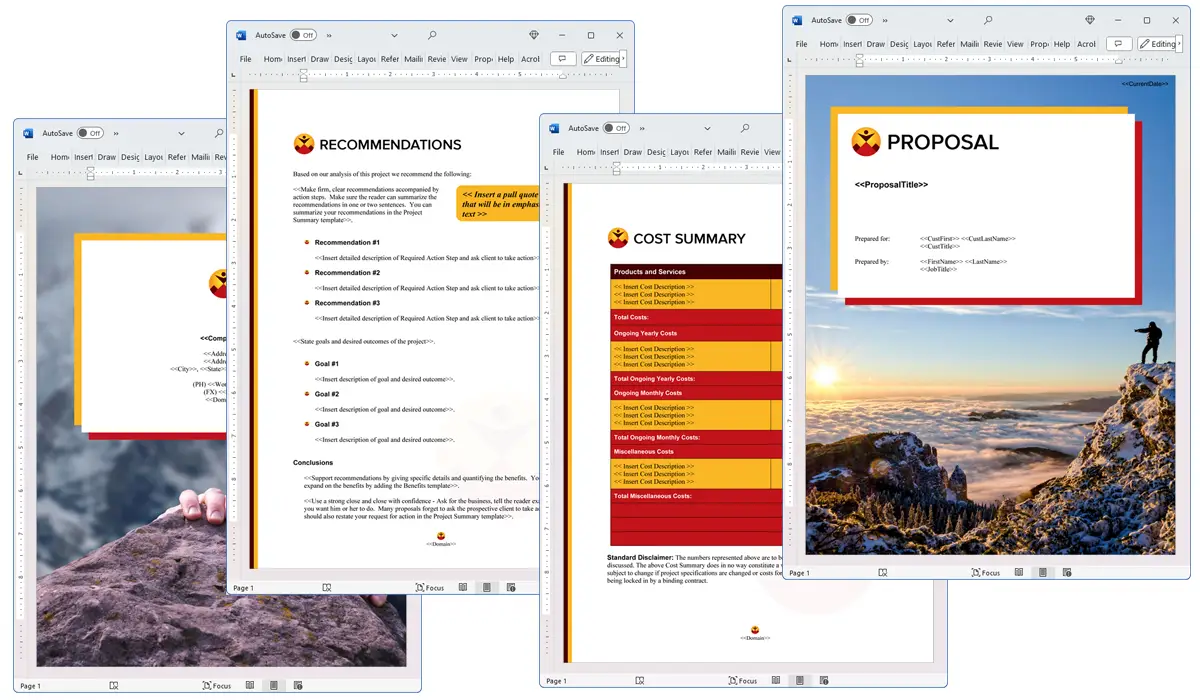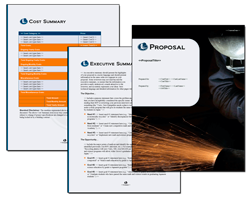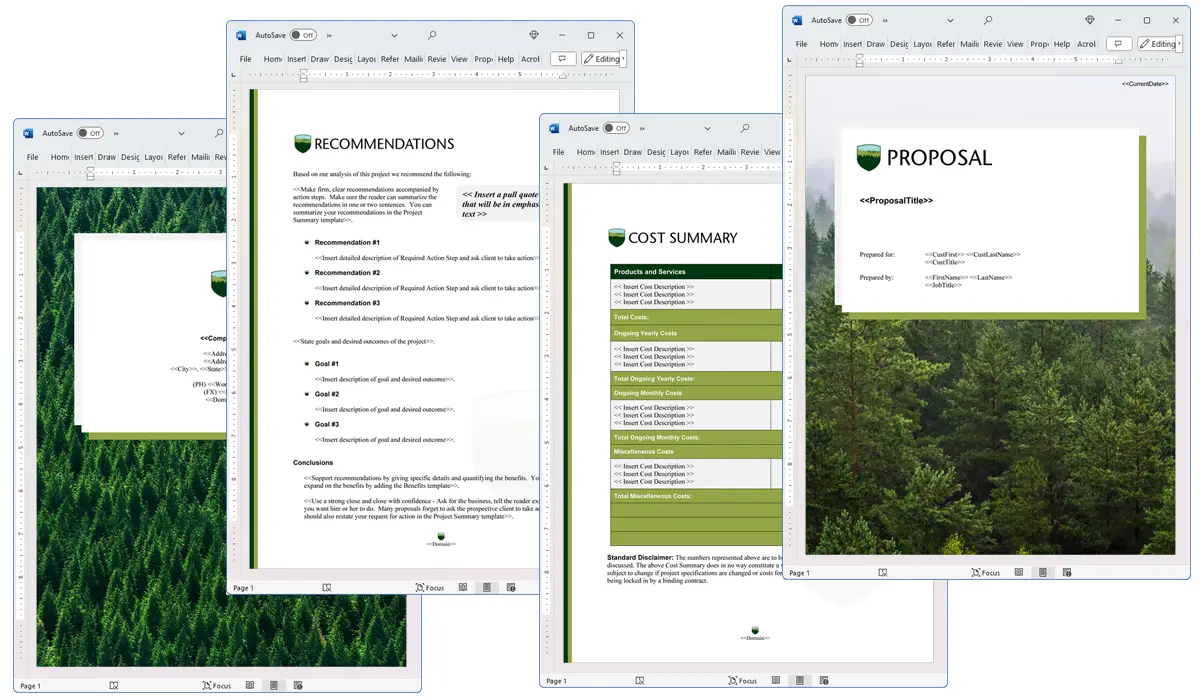What is the Interface Requirements chapter used for?
Proposal Kit Professional Bundle adds more design themes, all six Contract Packs,
a project management library, and Expert Edition software.

Illustration of Proposal Pack Business #24
We include this Interface Requirements chapter template in every Proposal Pack, along with thousands more. You assemble this chapter with others in various combinations to create custom-tailored business proposals, plans, reports, and other documents. Proposal Packs apply custom visual designs to the templates, giving the final documents a consistent professional finish.
 DOWNLOADABLE, ONE-TIME COST, NO SUBSCRIPTION FEES
DOWNLOADABLE, ONE-TIME COST, NO SUBSCRIPTION FEES
Overview of the Interface Requirements Chapter
The Interface Requirements chapter is a vital part of a business proposal, especially when the project involves designing or implementing systems that users will interact with directly. This chapter lays out the specific requirements needed to ensure that the interface-be it for software, a website, or physical equipment-is user-friendly and meets the client's expectations. By clearly defining how users will interact with the system, this chapter helps in setting the right framework for developers and designers to follow, ensuring the final product is aligned with user needs and business goals.
How is the Interface Requirements Chapter Used?
When used in a business proposal, the Interface Requirements chapter serves as a detailed guide for how the end-user will interact with the system or product. It is used to communicate to stakeholders the look, feel, and functionality of the interface before the development phase begins. This is crucial for gaining approvals and making adjustments based on feedback. Including this chapter in a proposal ensures that all parties have a clear understanding of the project's interface aspects, reducing the likelihood of misunderstandings and scope creep during the development process.
What is Included in the Interface Requirements Chapter?
Typically, the Interface Requirements chapter will include several key elements:
- User Interface Design: Describes the visual design and layout of the interface. This may include sketches or mockups illustrating the design.
- Functionality: Details what functions the interface must perform, such as buttons, forms, and other interactive elements.
- User Interaction: Explains how users will interact with these functions, including what happens when actions are taken.
- Accessibility Requirements: Specifies any requirements for making the interface accessible to users with disabilities.
- Technical Specifications: Lists any technical limitations or requirements, such as software platforms, browser compatibility, or hardware specifications.
Use Case Examples for the Interface Requirements Chapter
The Interface Requirements chapter can be applied in various scenarios, including but not limited to:
- Proposals for software development where detailing the user interface is crucial for project approval.
- Website projects where the client needs to understand how web visitors will navigate and interact with the site.
- Proposals involving the deployment of physical equipment that requires user interaction, ensuring the design is intuitive and meets safety standards.
- Projects that require alignment with specific industry standards or regulations affecting the interface design.
Key Takeaways
- Clarity: The Interface Requirements chapter provides a clear and detailed outline of how the end-user will interact with the system.
- Prevention of Misunderstandings: Including this chapter in your proposal helps prevent misunderstandings between developers, designers, and stakeholders.
- Feedback Incorporation: It provides a basis for feedback on the interface design before development begins, saving time and resources.
- User-Centric Design: Focuses on creating a user-friendly interface that aligns with user needs and business objectives.
- Comprehensive Planning: Ensures that all aspects of the user interface are considered, from visual design to technical requirements.

Illustration of Proposal Pack Industrial #3
 What Our Clients Say
What Our Clients SayAn excellent product for writing proposals. I have used this since 2000."
Lake Piso Technologies
 4.7 stars, based on 849 reviews
4.7 stars, based on 849 reviewsRelated Chapters
Document Layouts Using the Interface Requirements Chapter

The Interface Requirements chapter and other chapters are integrated into a Word document as illustrated here in the Proposal Pack Nature #9 design theme. There are hundreds of design themes available, and every design theme includes the Interface Requirements chapter template.
A proper business proposal will include multiple chapters. This chapter is just one of many you can build into your proposal. We include the complete fill-in-the-blank template in our Proposal Pack template collections. We also include a library of sample proposals illustrating how companies in different industries, both large and small, have written proposals using our Proposal Packs. This template will show you how to write the Interface Requirements.
We include a chapter library for you to build from based on your needs. All proposals are different and have different needs and goals. Pick the chapters from our collection and organize them as needed for your proposal.
Using the Proposal Pack template library, you can create any business proposal, report, study, plan, or document.
The Wizard software includes an AI Writer, which will write the content of this and any other chapter of your document. Use the AI Writer to do the heavy lifting, writing the first draft of your proposal or business document in minutes.
 Ian Lauder has been helping businesses write their proposals and contracts for two decades. Ian is the owner and founder of Proposal Kit, one of the original sources of business proposal and contract software products started in 1997.
Ian Lauder has been helping businesses write their proposals and contracts for two decades. Ian is the owner and founder of Proposal Kit, one of the original sources of business proposal and contract software products started in 1997.By Ian Lauder
 Published by Proposal Kit, Inc.
Published by Proposal Kit, Inc.


 Cart
Cart
 Facebook
Facebook YouTube
YouTube Bluesky
Bluesky Search Site
Search Site